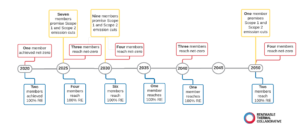By David Landolfi, DGA Winter Intern, and Blaine Collison, Executive Director

Organizational climate commitments have become a critical element of our efforts to combat climate change. These goals – whether around renewable energy use, overall or specific greenhouse gas emissions reductions, net-zero, supply chains, etc. – help us set our ambitions and define our work. Efforts like the Science-Based Target Initiative and RE100 have helped focus our efforts on high-value outcomes.
We took a look at the climate goals of the Members of the Renewable Thermal Collaborative, particularly around net-zero, renewable electricity (RE), and specific Scope 1 and Scope 2 emissions reduction targets. Many RTC Members are on their second- or third-generation climate goals having been long-time leaders on these issues and in the voluntary (RE) markets:
- Fourteen RTC Members have net-zero targets between 2025 and 2050.
- Sixteen RTC Members have committed to operating on 100% renewable electricity.
- Many Members have multiple, complementary goals, e.g., a net-zero goal as well as a specific RE goal.
- One Member has already achieved its net-zero goal and is now working on a net-positive by 2025 goal.
- Eight RTC Members’ net-zero goals have target dates between now and 2030.
That last point is the most striking for us: For many organizations, net-zero is not a mid-century target. It’s a less-than-ten-years-out target. These organizations are looking for opportunities to accelerate and scale their decarbonization immediately.
Industrial clients tell us that for their company, 30 years was just two intermediate-range planning cycles. Our growing collective ambition for mid-century, economy-wide decarbonization is just two intermediate-range planning cycles away. Our window for creating and scaling change is open, but it’s a tight window. We need to deploy an enormous amount of decarbonization in the very short time before it closes.
The RTC is dedicated to helping large thermal energy users decarbonize their thermal emissions within this window. We’re supported by a growing cohort of Solutions Providers – technology developers, advisors, financiers, market platforms, and more – that provide solutions. We currently host working groups focused on renewable natural gas (RNG), solar thermal, industrial electrification, greenhouse gas accounting and claims, and renewable thermal policy.
To learn more about our work and become part of the collaboration, please join us at our second annual (virtual) Summit on September 29-30, 2021.
To learn more about corporate climate goal-setting, check out the Power Forward report series. Power Forward has been analyzing climate and energy commitments among the largest U.S. companies since 2012. Power Forward 4.0, released this June, summarizes the current climate commitments of the Fortune 500, noting important trends and highlighting gaps.

